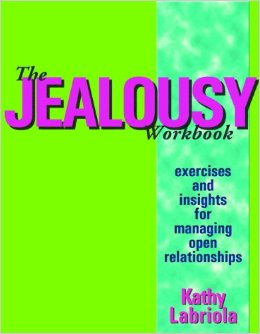
Click on cover to buy this book from Amazon.com $16.54
www.ejhs.org
2013, Greenery Press, 200 pages
Review by David S. Hall , Ph.D.

Click on cover to buy this book from Amazon.com $16.54
This useful paperback has just arrived as part of the expanding literature on open relationships (aka Polyamory or other forms of ethical non-monogamy). It is based on the author's many years and extensive experience in assisting people with the challenges of relationships they may not be prepared to deal with. Ms. Labriola is a nurse, hypnotist and counselor, and has written several books on open relationships.
Based on her work with the clients she has seen, it is by necessity focused on people with the problems that come with jealousy. This is only a subset of folks in open relationships, some of whom do not have the kind of problems she deals with. However, if you or your partner(s) are experiencing jealousy, this book is full of good exercises to help you through your rough spots. There are nineteen sections, containing forty-two specific exercises with well laid out instructions and examples from people who are experiencing the kind of problems you might be experiencing.
The first section gives you a broad view of jealousy, what it is and why it can be so powerful. The exercises in this section help one to understand what it is, where it can come from in any relationship, and how to prepare for it if you are beginning an open relationship. This would be useful to anyone thinking about opening a relationship and exploring ethical non-monogamy. It can give you insight into yourself and how you think about relationships. In particular, Exercise 3 is a cost-benefit analysis of opening your relationship, a very valuable tool.
Part Two, beginning with Exercise 8, contains tools to deal with jealousy when it shows up in a relationship. In particular I like Chapter 11, which is about unlearning three core beliefs that generate jealousy. The ideas were included in a paper in this journal in 2003 but in the explanation, exercises and examples, the author make them powerful tools in working throught jealousy. I also like Chapter 13, the three circles of "Poly Hell". These exercises make a lot of sense and deal with key issues in open relationships.
Chapter 17 brings in exercises and information from five other authors who have written about and taught about jealousy. This sharing of the work of others is a valuable tool and might lead the reader to other books or workshops that could be helpful.
The back of the book includes a list of other works on jealousy, some sources of workshops (mostly west coast) and other help in dealing with this problem.
This is a book I can recomment highly.
Return to Front Page